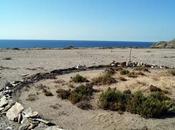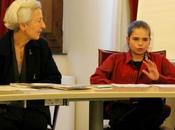Con questa intervista ad Andrea Salvadore iniziamo una breve serie di approfondimenti sul movimento Occupy Wall Street. Innanzitutto abbiamo chiesto ad Andrea in quale modo i manifestanti siano riusciti ad occupare un luogo così importante per l'economia mondiale senza un vero e proprio supporto politico o dei sindacati, utilizzando peraltro solo il proprio tempo libero. Andrea vede il movimento stesso come frutto delle aspettative che la campagna elettorale di Obama aveva creato, ma la sua singolarità è l'uso che è stato fatto dei social media e della comunicazione. [video]
La diversità di istanze e gruppi all'interno del movimento è stata considerata da molti un punto di debolezza, ma secondo Andrea è in realtà la sua vera forza, quello che veramente unisce i manifestanti. Naturalmente anche la cultura digitale, la crisi economica e la presenza del luogo simbolo Zuccotti Park hanno contribuito in varia misura, ma quella della coesistenza di anime diverse all'interno del movimento è una caratteristica molto americana, che rafforza le istanze invece di sfibrarle. [video]
 Quella di OWS è quindi una conversazione sull'ineguaglianza che non ha obiettivi immediati, ma che sicuramente avrà degli sviluppi, ripercussioni ed echi nella campagna elettorale. Andrea ha spiegato inoltre il meccanismo che ha "drogato" la democrazia americana negli ultimi anni, lo stesso che ha portato alla deregolamentazione delle banche, con il conseguente potere di fare leverage e di impacchettare i titoli derivati che hanno poi portato alla crisi economica. [video]
Quella di OWS è quindi una conversazione sull'ineguaglianza che non ha obiettivi immediati, ma che sicuramente avrà degli sviluppi, ripercussioni ed echi nella campagna elettorale. Andrea ha spiegato inoltre il meccanismo che ha "drogato" la democrazia americana negli ultimi anni, lo stesso che ha portato alla deregolamentazione delle banche, con il conseguente potere di fare leverage e di impacchettare i titoli derivati che hanno poi portato alla crisi economica. [video]
Il movimento rimane quindi profondamente americano, relativamente indipendente dalle strumentalizzazioni politiche e sindacali, e in questo si distingue nettamente dai movimenti italiani. Si tratta di una conversazione divenuta ormai maggioritaria, e in quanto tale non più ignorabile. [video]
E' difficile stabilire se un eventuale legame tra Occupy Wall Street e la Primavera Araba si sia effettivamente formato, ma i portavoce del movimento sostengono di aver raccolto molti messaggi e molti modi di comunicare da Piazza Tahrir, e di esserne stati molto influenzati. [video]
Abbiamo parlato anche del cambiamento di filosofia e visione che accompagna il passaggio del movimento da est a ovest, fenomeno ormai già in atto anche per una questione pratica, legata al clima rigido dell'inverno sulla East Coast. Infatti i nuovi epicentri del movimento sono Oakland e Portland, che così incorpora anime ancora più diversificate che a NY. [video]
Infine Andrea ha espresso la sua riflessione in merito a quello che sarà il peso delle istanze dei veterani all'interno del movimento e al futuro del movimento stesso nei prossimi mesi. [video]
Buona visione!
Maria Petrescu
Instant | Andrea Salvadore on the #OccupyWallStreet movement #OWS
This interview with Andrea Salvadore is the first of a short series of interviews about the Occupy Wall Street Movement: Andrea is an Italian director, author and documentarist, he lives in New York and represents the careful eye of an Italian towards the American reality. He has been covering the movement from the beginning, and he has also made a documentary about Zuccotti Park, aired by RAI.
First of all we asked Andrea how the protesters have managed to occupy such an important place for the economy without having proper support from politics or unions, just using their spare time. Andrea sees the movement itself as the result of the expectations Obama's campaign created, but it is unique in the use that has been made of social media and communication. [video]
The diversity of groups and problems inside the movement has been considered by many a weak point, but in Andrea's opinion they are its real strength, what really unites protesters. Of course digital culture, the economic crisis and the presence of a symbolic place like Zuccotti Park have also contributed in various ways, but that of the coexistence of diverse souls inside the movement is a very American characteristic, that reinforces the movement itself instead of weakening it. [video]
OWS is a conversation about equality that doesn't have immediate goals, but that will surely develop into consequences and echoes in the electoral campaign. Andrea also explained the mechanism that has "drugged" American democracy during the past few years, the same mechanism that has brought to bank deregulation, with the consequent power to leverage and pack derivate titles that have then lead to the economic crisis. [video]
The movement is profoundly American, relatively independent from political and union instrumentalizations, and in this it is very distinct from Italian movements. It is a conversation that has now become majoritary, and no longer ignorable. [video]
It's difficult to assess whether a link between Occupy Wall Street and the Arab Spring actually has formed, but the movement's spokesmen have affirmed that they have found great inspiration in Tahrir's messages and communication techniques, and that they have been greatly influenced by it. [video]
We also talked about the shift in philosophy and vision that accompanies the transition of the movement from East to West, a phenomenon that is already happening for practical reasons, related to the cold winter weather on the East Coast. In fact, the new epicentres of the movement are Oakland and Portland, and this way it incorporates even more diverse souls than in NY. [video]
Finally Andrea has expressed his opinions about what will be the influence of the veterans' problems inside the movement and about the future of the movement itself in the next few months. [video]
Enjoy!
Maria Petrescu






